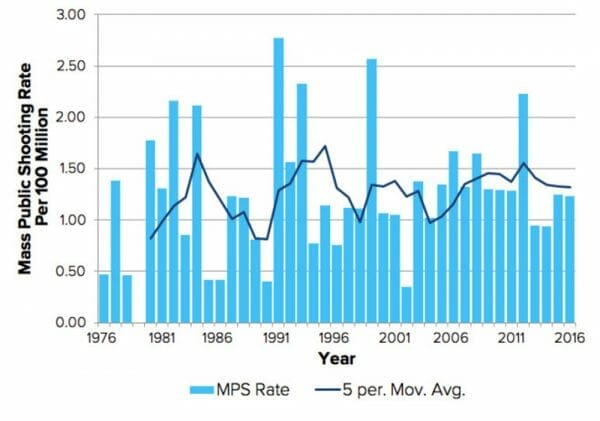
U.S.A.–-(Ammoland.com)- Deranged Americans with guns are killing people in groups. I realize that many readers of all stances on the subject of guns will regard this as a shocking admission in a gun magazine, but the facts matter.
Note that I have not yet made any claim about the rate of mass shootings or about what we ought to do to prevent them. What I’m doing here is negating the claim of gun control advocates that those of us who care about gun rights ignore homicides committed against crowds.
Is the number of mass shootings on the increase? This is a difficult question since we can’t get everyone to agree on what the term means. But if we adopt the definition that is generally accepted among researchers such as criminologist, Grant Duwe, and is what most people tacitly assume, “any incident in which four or more victims are killed with a firearm within a 24-hour period at a public location in the absence of other criminal activity (robberies, drug deals, gang “turf wars”), military conflict or collective violence,” the frequency has not risen. And the expiration of the federal “assault weapons” ban in 2004 did not change that frequency.
I am often told that I should present these facts to the families of the victims of mass shootings. The implication is that I don’t care about the pain of others, so long as I get to keep my guns. This is a faulty emotional appeal fallacy as well as a case of begging the question, since the assumptions being made are that the only answer to mass shootings is whatever variety of restriction is advocated and I’m a vile person for not feeling the same way that the advocates of control do.
When proposing social policy, it’s not enough to say that we care about the problem meant to be solved. Whatever we suggest as an answer must demonstrate a pattern of past success or at least a reasonable expectation of that in the future. And we have to consider who will be most affected by any new law that we enact.
With that standard in mind, what can we do that will reduce the number of people killed in mass shootings?
One answer touches on the domain of the First Amendment. I am among a number of people who would like to see a lot less fawning over mass shooters in the media. What do I mean here? The shooter’s face is on front pages of newspapers, the top of websites, and the lead in broadcasts. Every detail of his—and yes, it’s mostly males doing it—life, especially his every grievance gets discussed. He gains the coveted status of a celebrity.
I am not going to say that news organizations should be prevented from exercising their freedom of the press. That would be no better than imposing gun control. But the audience doesn’t have to watch, and in the Information Age, we can easily tell the producers that we want news: what happened, how did law enforcement yet again fail to do their jobs, and so forth. Yes, an analysis of the psychological aberrations of the shooter would be relevant, but make it clear what a loser he was.
This would be a small change, one that might not have a lot of effect, since mass shootings will get attention. The attention that needs to be given is to the criminal activity of would-be killers. Mass shooters often have a history of domestic violence, and as in the case of the Parkland shooter, they often give warnings for what they’re about to do.
Whenever an incident occurs, a lot of us question why law enforcement didn’t do anything beforehand, and the answer is exactly as expected. Cops spend most of their enforcement time—which is a small part of their hours on the job—going after petty crimes. I do want acts of vandalism to be prosecuted, but if we have to choose between going after someone who beats his wife, for example, or someone who tags a wall, the priority seems obvious to me. And the mere possession of substances declared to be naughty should be the business of the possessor alone.
That one step, allowing law enforcement to pay attention to crimes that correlate with future escalations, would reduce a lot of violence—violence against domestic partners, violence against classmates or coworkers, and ultimately, lethal violence against whoever the killer regards as a target. This is a solution that violates no one’s rights. Until we’ve tried it, gun control can’t even survive on pragmatic grounds.
About Greg Camp
Greg Camp has taught English composition and literature since 1998 and is the author of six books, including a western, The Willing Spirit, and Each One, Teach One, with Ranjit Singh on gun politics in America. His books can be found on Amazon. He tweets @gregcampnc.
